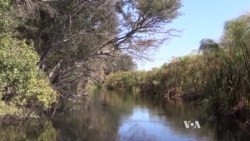Ancient Egyptians turned papyrus into paper and provided the world with it for thousands of years. Hundreds of thousands of books in the Royal Library in Alexandria and Rome's 58 public libraries were made of papyrus, almost all of the Western world’s literature and sacred texts at the time.
But the value of papyrus is not limited to paper. Writer and ecologist John Gaudet says ancient scholars considered it the wonder of the age. Egyptian civilization, he adds, might not have developed without papyrus.
“In the Nile Valley, to do things on a day-to-day basis, you also had to be able to get on the water so they used to use papyrus boats," he said. "And they used papyrus boats the way people today use fiberglass. People still make them in Ethiopia so we know what they’re like.
"Then they found they could also use the boats to build the houses on. They didn’t have to build their houses on land; they could build them on water. Then they found that they could do all kinds of things with papyrus; as you can imagine, you can make baskets out of it, you can make sandals, you can make rope. They made incredible amounts of rope, they exported the rope. So even before paper came to existence, papyrus helped the ancient Egyptians get along on a day-to-day basis.”
Over the centuries, though, many papyrus swamps were drained. Gaudet says people saw them as “wasted” spaces that could be better used for farmland or housing. In the process, he says, an incredible natural resource was lost. In addition to the variety of items that can be manufactured from the plant, the swamps provide habitat for birds and fish, and help control pollution.
“Papyrus actually filtered sewage and runoff and silt all those years," he said. "And papyrus happens to be a very, very efficient plant in a filter swamp.”
Gaudet says papyrus - one of the fastest growing plant species on Earth - has recently started to make a comeback. He points to several projects in Egypt to restore the swamps to filter sewage.
“A lot of the scientists there, the engineers, are beginning to see the value of a filter swamp because it’s cheap. It can be put in place at all different levels," he said. "You can either have a simple swamp, you don’t touch it, you just leave the swamp and it works. Or you can have a managed system where you take a swamp, you take some concrete liners, you divert the polluted water into the swamp and you clean it up that way. So the managed system is what they’re working on now. This is the same filter swamp concept we have used in the United States."
In his book, Papyrus, the Plant that Changed the World, Gaudet writes that papyrus swamps may hold the key to stability in some of the most unstable regions in the world. As fresh water becomes scarcer, he says papyrus can help preserve the resource.
“People always think of the wetlands or swamps as places where water goes in and never comes out," he said. "What I’m saying here is that the water seeps into the soil and therefore recharges the system underground that you don’t see. And also the papyrus, because the heads close over and form this canopy, it creates this very humid barrier underneath. It’s great because it actually prevents water from being lost. So it’s better to have papyrus than to have an open surface like a reservoir; if you have a reservoir in an arid zone, you tend to lose a lot of water by evaporation.”
Gaudet has traveled to Egypt, Sudan, Ethiopia, Uganda and other places where papyrus grows. He works with water experts there, and encourages officials to preserve papyrus swamps or restore them. He says that can benefit local economies.
“Wetlands in years to come are going to worth an awful lot of money for people in southern Sudan, throughout Sudan and central Africa and southern Africa, because it’s going to be a tourist resource, it's going to be a natural resource that they use for virtually everything, from local farming, small scale farming," he said. "They all use water from that system.”
Ecologist John Gaudet says he’s optimistic. As people rediscover the benefits of papyrus, he hopes the plant will once again flourish in the land it once ruled.















